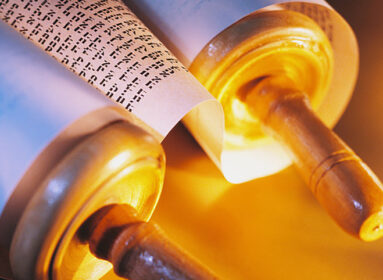By Shlomo Riskin ~
“And this is the life of Sarah” (Genesis 23: 1)
This week’s portion of Hayei Sarah – literally “The Life of Sarah” – is spread across two and a half chapters of the Bible. Chapter 23 of the Book of Genesis deals with Sarah’s death and Abraham’s protracted negotiations for the purchase of a grave for his beloved wife; chapter 24 details the painstaking search by Abraham’s trusted servant Eliezer, for a suitable wife for Isaac; and the first half of chapter 25 describes the death and burial of Abraham himself, concluding with the death of his son Ishmael. Is it not strange that a portion largely dedicated to the death of our major protagonists is named “The Life of Sarah”? Moreover, is there an overarching connecting thread that unites the two major pursuits in our portions: the acquisition of a burial plot and the “acquisition” of Rebekah?
Let us begin with our second question, mindful of the fact that Sarah’s burial plot, the Tomb of the Patriarchs in Hebron, is the first Hebrew land acquisition in the promised land of Israel.
We read in last week’s portion about the Covenant Between the Pieces, the unique covenantal partnership between God and Abraham in which the patriarch is promised, nay guaranteed, two things: progeny and land. Abraham will have progeny more numerous than the stars and his children will inherit a land whose borders will extend from the Nile to the Euphrates (Gen. 15: 18)
If indeed the land belonged to Abraham, why did he go to such lengths to convince the Hittites to sell it to him referring to them as his “masters”, bowing down to them (Gen. 23: 12) and eventually paying them the exorbitant price of 400 shekels of silver? Is this the way God bestows His gifts?
Apparently, a covenantal promise must be seen as a mutual endeavor in which God gives guarantees, but only after the recipient earns that Divine gift. We must be morally worthy of the gift: The covenant is predicated upon our compassionate righteousness and moral justice (Gen. 18:18, 19) and we must be willing to make financial and even the ultimate sacrifice for the land. From this perspective, it is prophetic that our first acquisition in the land of Israel is a grave. How many graves have been filled with the remains of our best and brightest who sacrificed their lives in order for us to acquire a secure resting-place in our promised homeland?
And the same prerequisite is necessary for the fulfillment of the second promise of the Covenant: progeny or seed. Hebrew progeny depends upon finding a proper mate and life-partner from the “family” of the covenantal people, either by birth or through conversion. It means marrying an individual with the right values, deeply committed to the Abrahamic vision of ethical monotheism and living a Jewish life in practice. Generally speaking, one can only acquire a proper mate if one is – himself or herself – a proper mate. This is why Abraham makes Eliezer swear that the woman will live in his land, and why Eliezer’s “fitness” test is based upon compassionate righteousness – for a servant as well as for a beast. Seeing to it that our children will be – and will seek – proper mates with whom to build a family dedicated to the continuity of the Jewish narrative is first and foremost our responsibility; only then can God’s covenantal promise of progeny “more numerous than the stars” be fulfilled.
Why is our portion called Hayei Sarah, the life of Sarah, if it chronicles her death and even Abraham’s death? The answer is that the death of the older generation is the way of the world, and it is not tragic as long as that generation gives rise to a subsequent generation that follows in its footsteps. That is what breeds an “eternal building,” eternal life.
And so towards the end of this week’s portion we find, “And Isaac brought [Rebekah] into his mother Sarah’s tent and he loved her… and Isaac was comforted after his mother’s [death].” And Rashi (Gen. 24:67 ad loc) cites a most apt midrashic comment: “Rebekah became modeled after Sarah. As long as Sarah lived, a light remained kindled from Shabbat eve to Shabbat eve, there was a special [hospitality] blessing in the dough, and the Divine cloud rested upon Abraham’s familial tent. When Sarah died, these expressions of love and light; Shabbat lights, challah and family purity ceased: but when Rebekah arrived, they returned.” And Sarah lived again!
Rabbi Shlomo Riskin is chancellor of Ohr Torah Stone and chief rabbi of Efrat, Israel.








 Southern New England Jewish Ledger
Southern New England Jewish Ledger









